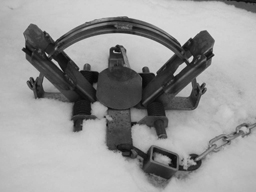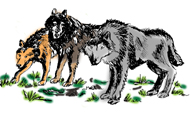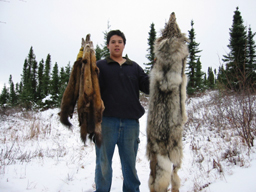#9 Alaskan wolf trap

Averaging
Trappers always refer to their average when they discuss the
money they make from selling their fur. ìI got an
average of $23 for my martin from ..."
"What was your average?"
Corey received the following prices for his fur. What was
his average for each?
|
Martin
$32
$24
$22
$26
$18
$22
$34
$36
$16
|
Beaver
$33
$20
$18
$36
$18
$20
$16
|
Wolf
$200
$220
$275
$175
|
Fox
$14
$12
$20
$18
$16
|
|

|

|
Marten are averaging $35, beaver $25, fox $20 and wolves
$250.
 Peter
traps because he loves to be out in the woods and it is part of
his heritage. He gets 97 marten, 0 beaver, 12 fox, and three
wolves. How much money does he make from his fur this year?
_______________
Peter
traps because he loves to be out in the woods and it is part of
his heritage. He gets 97 marten, 0 beaver, 12 fox, and three
wolves. How much money does he make from his fur this year?
_______________
His expenses were:
Gas $400
Snowmachine parts $250
New traps and snares $300.
New tent and other supplies (gloves, scent etc) $450
He didn't consider grub, as he would eat at home as well as on
the trapline.
How much does he clear after expenses? ____________
Deeper math
He pays about 20% in taxes including self employment tax.
He is able to depreciate his snowmachine for 5 years. He
paid $7,500 for a Polaris wide track.
How much does depreciating his snowmachine save him in one
year?
The next year in addition to his past efforts, he sets a few
snares for wolverine and lynx. He also hunts muskrats and traps
otter in the spring.

 Even
before Russian, European and American traders came to
Alaska, Native groups traded different furs for necessities
that were not locally available. It is impossible to
understand the history of the Alaskan bush without
understanding trapping.
Even
before Russian, European and American traders came to
Alaska, Native groups traded different furs for necessities
that were not locally available. It is impossible to
understand the history of the Alaskan bush without
understanding trapping.



 Peter
traps because he loves to be out in the woods and it is part of
his heritage. He gets 97 marten, 0 beaver, 12 fox, and three
wolves. How much money does he make from his fur this year?
_______________
Peter
traps because he loves to be out in the woods and it is part of
his heritage. He gets 97 marten, 0 beaver, 12 fox, and three
wolves. How much money does he make from his fur this year?
_______________ 